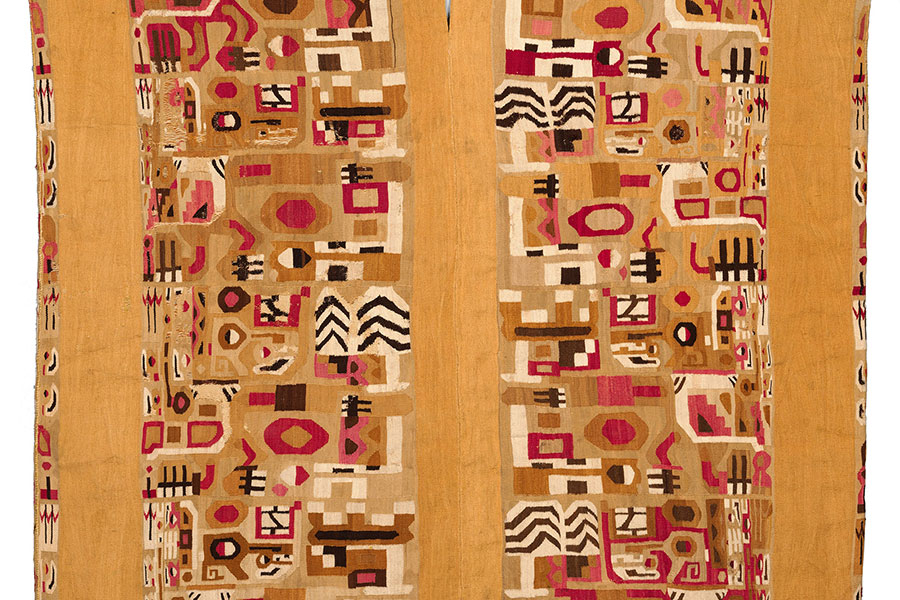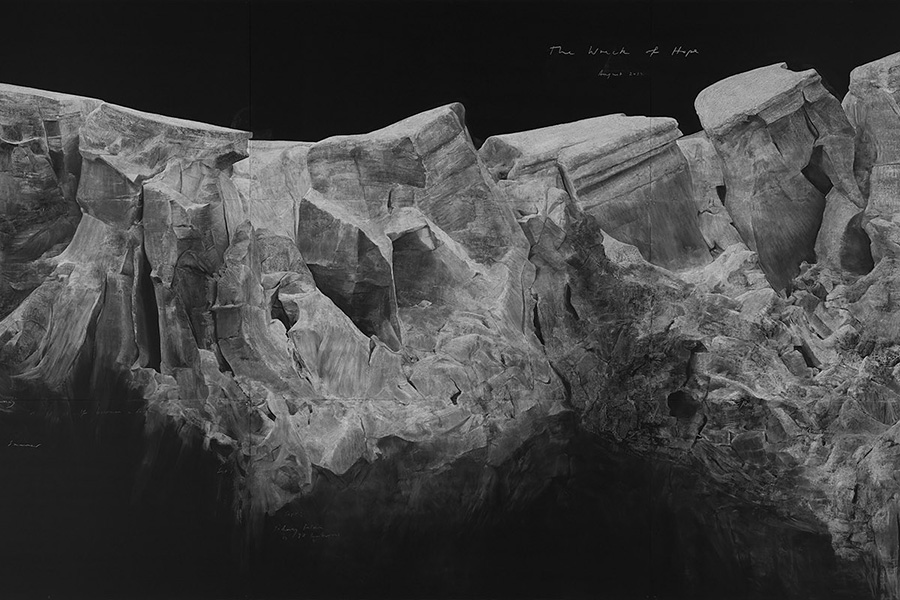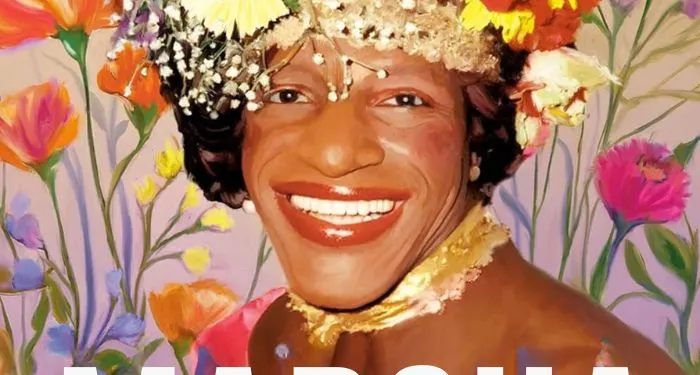Since Moby Dick has inspired barely quantifiable spin-offs and variations in every medium—movies (notably by John Huston), theatrical versions (notably by Orson Welles and recently by Robert Wilson), radio plays, television miniseries, paintings (by Jackson Pollock, Frank Stella, Sam Francis), multiple comic books and children’s adaptations (including a pop-up book for toddlers), at least one musical and one water ballet, a cantata by Bernard Herrmann, a celebrated drum solo by Led Zeppelin’s John Bonham, and countless jokes, posters, cartoons, and greeting cards—it is surprising that until the composer Jake Heggie and the librettist Gene Scheer’s Moby-Dick there has apparently been no opera.
As the first, unappreciated modernist novel, Moby Dick was not likely to be made into an opera by anyone in Herman Melville’s day. If Richard Wagner had not been wedded to the Teutonic he might have been just the one to take it on, with Ahab standing in for Odin and plenty of scope for even the longest of his monologues. Alternatively, Giacomo Meyerbeer perhaps: the composer of Le Prophète could have found Ahab a congenial principal role. The age of grand opera would not have flinched at Moby Dick himself—the whale that at the Met was seen only, at the last possible instant, as a photographic enlargement of an enormous eye. In 1850 at the Paris Opera, he would no doubt have made an appearance onstage, wheeled out in the form of some impressive mechanical hulk, spouting geysers of steam. The Met’s production did at least once evoke that era: as Ahab baptized his harpoon in blood in the name of the Devil, holding it up against the lurid flames of the Pequod’s try-works, we were for a moment, and quite appropriately, back among the infernal colorings of Der Freischütz, Robert le diable, or Faust.
Nearly two centuries later the figures of the White Whale and Captain Ahab with his ivory stump are recognizable to vastly more people than in Melville’s lifetime, and likewise to vastly more than have read the book even in part. At a New York Public Library event preceding their opera’s opening at the Met, Heggie and Scheer expressed the hope that it might encourage audiences to turn to the source as well. It’s as if Moby Dick had achieved (after such prolonged initial neglect) a cultural position so august as to disappear into its own aura, heard of everywhere but rarely encountered, like the whale itself.
Moby-Dick was first performed in 2010 by the Dallas Opera and has traveled around a good deal since then. (For their title Heggie and Scheer have adopted the hyphenated form of the book’s first American edition.) Its popularity is understandable: as a theatrical experience it is effective and often affecting, especially as performed at the Met by a remarkable ensemble. The orchestra, under Karen Kamensek’s direction, did full justice to Heggie’s sweeping approximations of storm and undertow and bustling shipboard interaction; Brandon Jovanovich (Ahab), Peter Mattei (Starbuck), Stephen Costello (Greenhorn), Ryan Speedo Green (Queequeg), Malcolm MacKenzie (Stubb), and Janai Brugger (the only woman in the cast, as the cabin boy, Pip) brought force and conviction to these archetypal roles. Leonard Foglia’s production, with sets by Robert Brill, was full of quick alterations of spatial perspective—the staging moving horizontally and vertically at once, across the deck and up the masts, Ahab hoisted on high to assume the masthead watch or Pip adrift in the depths of the ocean, the top deck sliding open to reveal the ship’s innards, the diagonally pitched back wall becoming an ocean filled with whaleboats in the form of projected outlines, with capsized crewmen sliding downward—abstractions and changes that at least suggested Melville’s startling juxtapositions and switched viewpoints.
An opera, however, must stand alone, and no one (including its creators) would equate Moby-Dick with Moby Dick. Drastic paring and reshaping were inevitable if the project were to be undertaken at all. The upshot is essentially a skeletal drama revolving around six principal characters—backed by a very active chorus of shipmates—in which from first to last the action is restricted to the Pequod and the waters around it. The Spouter Inn, Father Mapple’s sermon, Elijah’s baleful wharfside prophecies, and the other elements of Melville’s foreboding prelude are gone. We begin below decks, with Queequeg intoning a Polynesian chant while Ishmael grouses about his interrupted sleep before the two bond over a shared pipe. Ishmael is presented as Greenhorn, an anonymous beginner, and “Call me Ishmael” are not the first but the last three words in the opera, as if the story were resolved by the acquisition of a name and all the experience it implies.
It’s a compact work that from the start progresses fairly swiftly from one salient incident to another. Sailors exchange conversation about Captain Ahab, remarking on his strange absence from view, and then he emerges abruptly into the midst of the assembled crew, almost lost in the crowd for a moment. Everything moves at a clip—Ahab’s exhortation to the crew, the nailing of the doubloon to the mast, the ritual crossing of harpoons as pledge—and in what seems no time at all the stage resounds with a thumping chorus of “Death to Moby Dick!” Heggie’s orchestral score drives propulsively forward, stitching disparate episodes together without the doldrums and repetitive tasks of a long voyage to slow things down. We are necessarily confronted more with, say, crew members climbing energetically among the riggings than with the immensity and mysteriousness of the unseen object of Ahab’s monomaniac chase. Where Melville in some six hundred pages can linger voluptuously over any gesture or image or premonition—taking as long as he likes to sound depths of interiority, whether of the mind or the ocean or the cavernous body of the whale—the opera, running about two and a half hours, must be built from concrete actions.
In interviews Heggie has remarked on how much music there is in the book. Some of that is literally the description of sound: the “sound so strangely muffled and inarticulate that it seemed the mechanical humming of the wheels of his vitality in him” as Ahab nails the doubloon to the mast, or the sound “strange, long drawn, and musically wild and unearthly” as Tashtego cries out, “There she blows!” Such descriptions, in their context, function as music themselves. Melville insists on being read slowly enough to allow the textures and cadences of his sentences to make themselves felt with their proper weight. In that sense the music is continuous, even when the mode is ostensibly that of a technical manual. I recall hearing the poet J.D. McClatchy read with measured precision the final paragraphs of the book’s last chapter and then remark to an apparently stunned audience, “That is what used to be called prose.”
Emerging out of that wall of sound are the many separate voices, each with its distinct dialect and personal peculiarities, captured in monologues long or short. Despite a good many chapters presented in dramatic form, there are few proper conversations in the book, aside from certain unavoidable face-offs. Most of the time it is more a question of adjacent soliloquies and inner ruminations; characters eavesdrop on one another or simply talk to themselves, “each Isolato living on a separate continent of his own.” There is always a sense of how, on such a long and uninterrupted voyage, language spins around itself or flies off on unforeseeable tangents.
The problem for any adapter is that almost all of that has to go. Scheer’s libretto carves out two parallel narratives. On the one hand there is Ahab asserting his dominance, rallying the crew in pursuit of his obsessive quest to kill the white whale and then in private peering into his own solitariness in an aria (“I leave a white and turbid wake”) that establishes him as the embodiment of a permanent unrest, expressed by Heggie in vocal settings that often stretch syllables over multiple notes as if racked. (Ahab is a tenor role, appropriate for high, thrusting jabs.) The contention between Ahab and his first mate, Starbuck, serves as the through line of the opera and the occasion of its most powerful music. Starbuck becomes central as Ahab’s only active challenger, attempting to turn the captain from his purpose by every means of argument or emotional suasion, in a triad of strong scenes, most particularly the pivotal aria in which he contemplates murdering Ahab in his sleep to save ship and crew.
As the rationalist—perhaps the only one on board—who can understand the likely consequence of his inaction but not bring himself to act, Starbuck makes for a poignant and highly theatrical figure. As someone who under ordinary circumstances goes about his business of killing whales and takes to heart the financial interests of the ship’s owners, he finds himself at a crux where he alone might alter fate, but for the fact that everything he is—loyal mate and devout Christian—prohibits him from doing what must be done. Frozen in place with musket in hand, Mattei made the most of a lament that seemed forced out of him by his viselike indecision.
On the other hand, we have the coming-of-age story of Greenhorn, with his naive ambition to “see the world” being tested by the rigors and ultimate catastrophe of life on the Pequod, while his solipsistic namelessness finds relief in his loving friendship with Queequeg. Greenhorn cannot be Melville’s Ishmael, since he has been stripped of his private mental life, with its layers upon layers of speculation that take up so much of the novel. Seen in his outward form of youthful uncertainty and inexperience, he has little to do dramatically aside from observing the main action from the margins. In a wistful duet with Queequeg among the riggings he dreams of returning with his friend to the island where he was a prince, learning his language, and becoming part of his culture, a scene with no equivalent in Moby Dick but evoking the more Edenic episodes of Melville’s first book, Typee.
This duet, providing an idealized escape from the otherwise relentless progression of the Pequod toward its doom, is followed later by a trio in which Greenhorn, comforting the apparently dying Queequeg, is joined by Pip, now half mad after being rescued from a deep plunge into the ocean. The three of them, clustered affectionately, are framed as a band of outsiders, empathetic and mutually supporting, indifferent to the destructive forces of power, profit seeking, and vengefulness. This prolonged moment of clinging together is the only way the need for the warmth of love, or simply of human contact, can make its way into the opera (discounting the comical dance of the sailors that degenerates rapidly into a racially charged fight). Its mood is sorrowful, although if it has a counterpart in Melville it might be a scene in an altogether different key in which Ishmael, tasked with squeezing out the lumps in whale sperm, experiences a “strange sort of insanity” and finds himself squeezing his shipmates’ hands: “Come; let us squeeze hands all round; nay, let us all squeeze ourselves into each other; let us squeeze ourselves universally into the very milk and sperm of kindness.” That would be harder to stage but might prompt a suitably textured aria.
For me the most daring and moving juncture, toward the end of the first act, was the abrupt transition to the oceanic deeps in which Pip is lost. As the opera’s only female voice, Janai Brugger stood out from the beginning, animating the dance scene with her tambourine and for an instant making the Pequod a site of communal enjoyment. There was a hint of laughter in the audience at seeing her moving across the stage while suspended on a wire, against a rudimentary backdrop representing Melville’s “wondrous depths, where strange shapes of the unwarped primal world glided to and fro.” The laughter may have been a reaction to the very visible wire, as if realistic special effects were an internalized expectation, but Brugger sang beautifully, and the brief scene injected what had otherwise been absent: the presence of the waters underlying everything. However simple the stage design, the effect was nonetheless radical.
For after all Moby Dick is only in part a human story. The other part belongs to whales and water, and Melville’s seeming digressions, in which he draws away from human drama and surveys the body of the whale in all its aspects, inner and outer, are a way of providing enough space to put the humans in proper perspective. So much of the book is there to suggest (however vain the attempt) the immensity and power and mystery of the beings that the Pequod is engaged in chopping up and storing in its industrial onboard warehouse. In contrast to those scenes of harpooning and slicing, there is the extraordinary chapter “The Grand Armada,” in which Ishmael, caught in the midst of a pod of whales clustered to protect their females and offspring from the attacking whaleboats, is given a glimpse of nonhuman bliss:
Thus, though surrounded by circle upon circle of consternations and affrights, did these inscrutable creatures at the centre freely and fearlessly indulge in all peaceful concernments; yea, serenely revelled in dalliance and delight. But even so, amid the tornadoed Atlantic of my being, do I myself still for ever centrally disport in mute calm…deep down and deep inland there I still bathe me in eternal mildness of joy.
It is a vision resistant to any staging, although one can imagine Janáček or Messiaen giving the inscrutable creatures actual voices.
It is not surprising that any operatic adaptation should spark thoughts of other possible versions, since Moby Dick itself is the compendium of a thousand other potential books. Moby Dick’s literal final breaching is only the most visible sign of a breaching of limits on every level. Even Melville could only accomplish such a thing once. In his chapter “The Try-Works” he finds the true wisdom in Ecclesiastes—“‘All is vanity.’ ALL.”—a wisdom denied to “he who dodges hospitals and jails, and walks fast crossing grave-yards, and would rather talk of operas than hell.” Yet a moment later, acknowledging that “there is a wisdom that is woe” but also “a woe that is madness,” he conjures the image of an eagle in the Catskills, diving into “blackest gorges” but able to “soar out of them again and become invisible in the sunny spaces.”
He might be describing the paradoxical nature of a book oscillating continuously between annihilation and an ecstatic freedom. The work that Heggie and Scheer have made tends toward a frequency attuned to sorrow, whether that of Ahab conscious of his own self-destruction, of Starbuck lacking the moral strength to stop him, or of Ishmael as the final, devastated survivor. That note of plaintive regret seems to suit a moment when the image of a ship eddying toward doom under the guidance of an unrestrainable commander once again seems freshly minted. Melville’s eagle soaring out of mountain gorges may have to await another day.


















 English (US) ·
English (US) ·